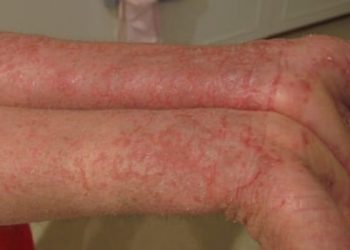AbbVie: Rinvoq, a monoclonal antibody against JAK enzyme, has superior efficacy in patients with atopic dermatitis compared to Dupixent
- 20% of patients treated with Rinvoq achieved 90% or greater reduction on the Eczema Area and Severity Index (EASI) and attained a 0 or 1 grade on the Worst Pruritis Numerical Rating Scale (WP-NRS) compared to 9% of patients treated with Dupixent.
- The rate of serious adverse events was 0.9% for both Rinvoq and Dupixent.
The Latest
A recent open-label, phase 3b/4 study funded by AbbVie investigated the efficacy of AbbVie’s Rinvoq (upadacitnib) compared to Regeneron and Sanofi’s Dupixent (dupilumab) for treating moderate-severe atopic dermatitis. Twenty percent of patients in the Rinvoq group achieved a 90% or greater reduction on the Eczema Area and Severity Index (EASI) and attained a 0 or 1 grade on the Worst Pruritis Numerical Rating Scale (WP-NRS) when compared to the Dupixent group. The previous Heads Up trial compared Rinvoq at 30mg daily to Dupixent in 692 adults with moderate-to-severe AD and showed that 71% of patients achieved a 75% reduction in EASI compared to 61% for Dupixent after 16 weeks. However, in that study, rates of serious infection were higher in Rinvoq group, including one death.
Physician’s Perspective
Atopic dermatitis (AD) is a chronic, relapsing inflammatory skin condition that results in cycles of intense itching that can lead to skin breakdown and increased risk of superimposed infection. AD can affect up to an estimated 10% of adults and 25% of adolescents. Patients with mild to moderate AD are usually treated with topical therapies. However, patients with moderate to severe disease normally require systemic therapy.
Molecular Target of Therapy
Atopic dermatitis is a chronic, inflammatory skin disorder associated with high levels of proinflammatory signaling molecules such as interleukin 4 (IL-4), IL-13, IL-22, IL-31, and interferon gamma (IFN-y). These pro-inflammatory signals activate the Janus kinase-signal transducer and activator of transcription (JAK-STAT) signaling pathway to mediate their pro-inflammatory effects. Dupixent is a human monoclonal antibody that inhibits signaling through both IL-4 and IL-13 and was approved for treatment of AD in 2017. In contrast, Rinvoq is a JAK inhibitor and was first approved for use in patients with rheumatoid arthritis in 2019. Approvable of Rinvoq for treatment of AD in patients age 12 and older was granted in 2022.
Company History
AbbVIE was founded in 2013 and produces several immune-modulators such as Skyrizi and Humia, that are widely used for treatment of diseases such as psoriasis, Crohn’s disease, rheumatoid arthritis, and ulcerative colitis. Sale for Rinvoq generated $4 billion in revenue in 2023. There are ongoing clinical trials for use of Rinvoq in alopecia areata, ankylosing spondylitis, axial spondyloarthritis, Crohn’s disease, giant cell arteritis, hidradenitis suppurativa, psoriatic arthritis, rheumatoid arthritis, systemic lupus erythematosus, Takaysu arteritis, ulcerative colitis, and vitiligo.
Further reading: https://www.ncbi.nlm.nih.gov/pmc/articles/pmid/34347860/
©2024 2 Minute Medicine, Inc. All rights reserved. No works may be reproduced without expressed written consent from 2 Minute Medicine, Inc. Inquire about licensing here. No article should be construed as medical advice and is not intended as such by the authors or by 2 Minute Medicine, Inc.







